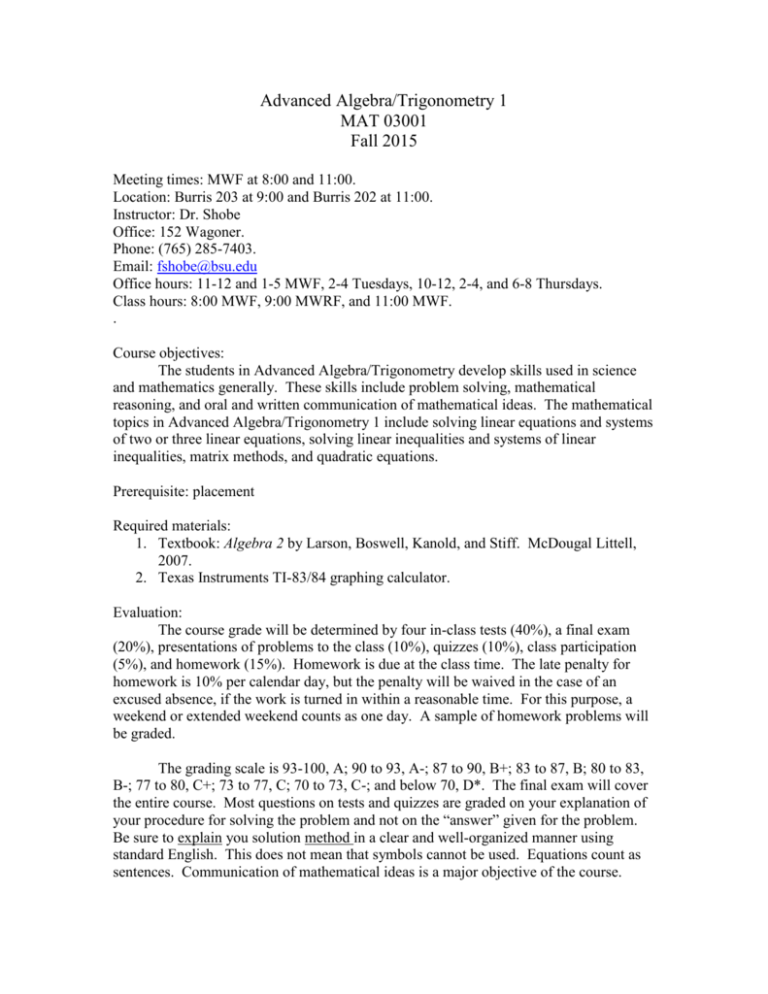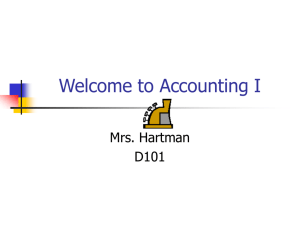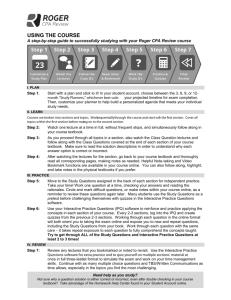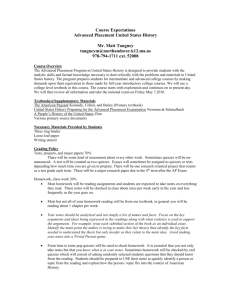Advanced Algebra/Trigonometry 2
advertisement

Advanced Algebra/Trigonometry 1 MAT 03001 Fall 2015 Meeting times: MWF at 8:00 and 11:00. Location: Burris 203 at 9:00 and Burris 202 at 11:00. Instructor: Dr. Shobe Office: 152 Wagoner. Phone: (765) 285-7403. Email: fshobe@bsu.edu Office hours: 11-12 and 1-5 MWF, 2-4 Tuesdays, 10-12, 2-4, and 6-8 Thursdays. Class hours: 8:00 MWF, 9:00 MWRF, and 11:00 MWF. . Course objectives: The students in Advanced Algebra/Trigonometry develop skills used in science and mathematics generally. These skills include problem solving, mathematical reasoning, and oral and written communication of mathematical ideas. The mathematical topics in Advanced Algebra/Trigonometry 1 include solving linear equations and systems of two or three linear equations, solving linear inequalities and systems of linear inequalities, matrix methods, and quadratic equations. Prerequisite: placement Required materials: 1. Textbook: Algebra 2 by Larson, Boswell, Kanold, and Stiff. McDougal Littell, 2007. 2. Texas Instruments TI-83/84 graphing calculator. Evaluation: The course grade will be determined by four in-class tests (40%), a final exam (20%), presentations of problems to the class (10%), quizzes (10%), class participation (5%), and homework (15%). Homework is due at the class time. The late penalty for homework is 10% per calendar day, but the penalty will be waived in the case of an excused absence, if the work is turned in within a reasonable time. For this purpose, a weekend or extended weekend counts as one day. A sample of homework problems will be graded. The grading scale is 93-100, A; 90 to 93, A-; 87 to 90, B+; 83 to 87, B; 80 to 83, B-; 77 to 80, C+; 73 to 77, C; 70 to 73, C-; and below 70, D*. The final exam will cover the entire course. Most questions on tests and quizzes are graded on your explanation of your procedure for solving the problem and not on the “answer” given for the problem. Be sure to explain you solution method in a clear and well-organized manner using standard English. This does not mean that symbols cannot be used. Equations count as sentences. Communication of mathematical ideas is a major objective of the course. Students present homework problems to the class on a rotating basis. The “bonus” and “double bonus” designations on the homework list refer to the presentation of the problems. A student presenting a bonus problem can earn a score of 11/10 and a student presenting a double bonus problem can earn a score of 12/10. Except on the days of major tests, an extra credit problem will be posted. This will be applied to the homework grade. The extra credit problem is due in the same class period in which it is given. Extra credit is occasionally available on tests, homework, and quizzes. For example, showing an algebraic check for the solution of an equation will result in an extra credit point except when the check is required by the solution method. Exceptional solutions or exceptional explanations of solution methods will sometimes be rewarded with an extra point. The class participation grade is assessed for the time between consecutive tests. For each period the participation grade is based on 100 and students start with a 90. Two points are added for each day there is a constructive contribution to class discussion, including questions, answers, comments, or corrections. Four points are added for each day a student presents a problem requested by someone in the class, other than the student’s regularly scheduled presentation. A maximum of four points per day will be added altogether. Two points are subtracted for each instance of disruptive behavior or of disrespect for anyone. One point is subtracted for each instance of nondisruptive offtask behavior, such as sleeping or working on unrelated tasks. Ten points are subtracted for each unexcused absence, and one point for each five minutes (or fraction thereof) tardy. A student who attends any part of the class meeting is tardy, not absent. Unexcused early departures are treated in the same way as tardies Test Schedule: Test 1 Wednesday August 26 Test 2 Wednesday September 23 Test 3 Monday November 2 Test 4 Wednesday December 9 Chapter 1 Chapter 2 Chapter 3 Chapter 4 Equations and inequalities Linear equations Linear systems Quadratic functions Attendance policy: Each student is required to attend every class meeting except when an absence is excused by the School Nurse or the Director of Academic Affairs. Work that is missed as a result of an excused absence can be made up. Work that is missed as a result of an unexcused absence will receive a grade of 0 and cannot be made up, except that a major test can be made up for fractional credit. The penalty for a major test is a deduction of 20% of the number of possible points. Typically 100 points are possible and the penalty would be 20 points. When it is known in advance that an excused absence will occur, the student should make arrangements before the absence for making up the work that will be missed. A student who arrives tardy is responsible for checking in with the instructor. A student who arrives late and does not check in may be counted absent (unexcused). How to study for this course: The most important things are to read the textbook carefully and practice solving problems. Make a contribution to the class every day, but give others a turn too. Take notes in class: even if you don’t look at the notes again, the process of taking them will make you a more active listener. Keep up with the reading and homework. Mathematics is very sequential and it is difficult to recover if one gets behind. When you get stuck, ask for help, but struggle with the idea until it is your own. When others get stuck, help them if you can. Review for the tests. Read the section of the book before working on the problems. Challenge each statement or step in your mind and make sure you are independently convinced that it is valid. You will very rarely if ever be asked to take something on authority. I have heard students say, “I can’t learn from a math book.” The statement should have been, “I have not yet learned how to learn from a math book.” This is a necessary skill in a college math course and it is necessary to a degree here also since we have a modified college schedule. Do the homework. Do not attempt to memorize procedures as you work. Instead, concentrate on developing your reasoning skill. This comes through practice, not through watching someone else. If you get stuck, discuss ideas with a teacher, a tutor, or another student, but be just as skeptical as you are about statements in the textbook. Challenge each idea until you have rejected it or made it your own. Mathematics is (among other things) a language and vocabulary is important. The highest priority for items in your notes is definitions. The textbook helps you with this by putting important terms in boldface and highlighting them in yellow. The chapter review at the end of each chapter has a vocabulary list with the page number for the definition. As is true with learning a foreign language or with vocabulary development in English, memorizing lists of words and definitions or drilling with vocabulary cards is not the most effective method. You must practice using (reading, writing, speaking, listening) the words in context to get the nuances just right. The lists or cards can be a handy reference when you need to look up a word. Because of the modified college schedule, there is limited review time in class for tests. The students are responsible for most of the review. The textbook can help. Each chapter has a chapter summary (See page 60 for Chapter 1) that lists the main skills that were developed in the chapter. Practicing problems of the type that will be on the test is the most important single review activity. The textbook has a sample chapter test at the end of each chapter. (See page 65 for the Chapter 1 test.) For students who need extra practice, the textbook has a chapter review. (See pages 61-64 for Chapter 1.) I found it helpful when I was in college to reread the chapter in one sitting a day or two before the test. I encourage you to try this. Technology: I expect you to have a suitable graphing calculator in class. Its use will be allowed and expected for most in-class activities and tests. There may be restrictions on its use on some tests and quizzes. Laptops are permitted in class but not required. Keep the volume turned down. The laptop should be silent during class except for the clicking of the keyboard. You may not read or send email, play games or music, use instant messaging, participate in chat rooms, or download music or audio files during class. You may use the laptop for taking notes. If you write your homework solutions using the laptop, either print the assignment before coming to class or email it to me. Do not hide toolbars. Keep all items you are working on visible on the screen and available for teacher inspection. Keep the laptop and cell phones turned off and closed during tests and quizzes and stowed off your desk top. Academic integrity: Honesty, trust, and personal responsibility are fundamental attributes of the Indiana Academy. Dishonesty diminishes the value of being an Academy graduate and puts honest students at an unfair disadvantage. I will try to maintain an environment that supports honest work and that treats everyone fairly. The Academy policy is stated in the section Student Academic Integrity of the Student Handbook. I support this policy and will report problems in this area to the Academic Integrity Board. I support due process for anyone accused. I will also prosecute using the procedures in the Student Handbook whenever I am convinced that the evidence is strong enough to gain a conviction. In cases where there is a reasonable suspicion without sufficient evidence for an accusation, I will take preventative measures, which may include assigning seats for tests, patrolling the room during tests, checking papers or calculator memories accessible to students, detailed comparison of test papers, and giving different tests to different students. I invite you to tell me privately if you observe cheating or believe that it is occurring. You may serve as a witness if you consent, but you will not be required to. If the evidence is credible but does not support an accusation, I will apply preventative measures. I usually assign seats for tests. Work done in class on tests or quizzes is to be your own. Keep cell phones and computers away from your work during tests and quizzes. Keep calculators off your desks during noncalculator sections of tests and quizzes. Work done outside class on homework should be your own but the following collaboration is allowed and encouraged. You may ask questions of and receive hints from me, other teachers, other students, or anyone else. You may proofread each other’s work and point out possible errors. You may discuss methods you used with each other. If you have any questions about this or other matters, please come in and ask.




